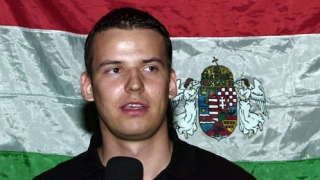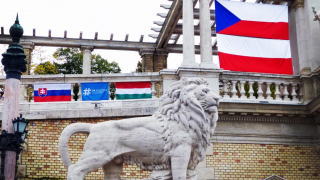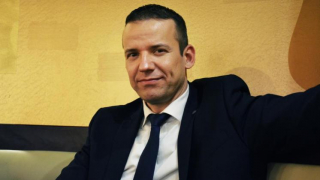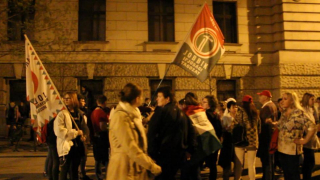Istvan Lovas: In Hungary the media are much freer than in Germany or in France
Interview with Hungarian journalist Istvan Lovas (January 2018)

- Do you believe in «independent journalism» today?
- Independent journalism in the sense of a media that is independent?
- I mean, without ideology.
- Well, without ideology – no. Of course, the mainstream media, every one of them, they have an owner. That`s different. But if you have an independent one, then, it has an ideology – like Austrian Unzensuriert, or Wochenblick. They have an ideology, it`s not a problem. Basically, I don`t know any media that has no ideology, no attraction to one or another side. No.
For instance, I have my web-site [lovasistvan.hu], with about 100 000 reads, which in the country of ten millions is not bad. Lot`s of Russia Today, Sputnik news, Chinese media…
And you know, I have an ideology. So, what`s wrong with that? I`m independent. Well, Facebook can ban me, but I have an ideology, and I stick to it. Like it or not, I love Russia, I love China because they are for peace and global cooperation, and I have a lot of children and grandchildren who need to live in peace. Why should I love the United States, which is for wars and sanctions?
-I was reading the Western media. Many of them talk about Hungary the same way as they do about Russia, i.e. that the country is «media dictatorship», «withoutfreedom of speech», etc.
- It`s a lie, it`s not true.
In Hungary the media are much freer than in Germany or in France.
You can write about the prime minister whatever you want. Whatever you want to say, you can write it in Hungary. Just look at what the opposition media says. In the case of Hungary, foreign journalists would echo any lie they here from the opposition figures in Hungary, and they forget everything about fact checking.


-Why don`t they see it and continue to talk about some dictatorship?
- Let`s start with the media. They say that 90 percent of the Hungarian media is in the hands of government. Let’s check it out. It is very simple. Let us s walk into a supermarket, to a gas station. And look, for instance, at the national political weeklies that are there. There are about 10 – 8 of them belonging to the opposition. And there are two pro-government political weeklies. Let`s walk into the same place and let`s look at the national political dailies. Two of them are pro-government, and two of them are pro-opposition.
Look at television: you have RLT Club. Its news program has a viewership of about one million. The news program of the Hungarian public broadcasting service has about 100 000 viewers, ten times less than RTL Club. Plus you have Hir TV and ATV – two news television stations, both supporting the opposition. What are you talking about? I just don`t understand.


Look at the online media, many of them are pro-opposition. Again, we are confronting an ugly lie.
No Western journalist would give me an interview. Only for journalists belonging to the opposition. They are afraid of giving me an interview. I`ve tried to it several times.
- I also have a question about Russia. In the opposition media I`ve seen some accusations like «Hungarian media are pro-Russian, it is Russia Today propaganda».
- In January, the Democrats in the US Senate prepared a document. It contained a little bit more than 200 pages. It has a short part on Hungary. And on of the «evidences» that Hungary is in the hand of Putin was that Magyar Hírlap, one of the dailies I also work for, uses Russia Today and SputnikNews as a source. Isn`t it horrible? Using Reuters, BBC, CNN, whatever, and also Russia Today!
Hungarian public broadcasting services (television, radio etc) mention the news media - BBC, Reuters, Associated Press, Agence France Presse etc. – and very very rarely RT or Sputnik. That`s a proof of Russian influence…
- I would like to ask about Radio Free Europe. Now it`s terrible…
- I get the email alerts from Radio Free Europe and Radio Liberty. It is a disaster. It`s a neocon handmaid.
- You had an experience, working some time for RFE…
- Absolutely, I was working from November 1984 until the end of 1989. That was the Cold War, and I was 100% with the free West. Just like today I am 100% with Russia and China.
- So, my question is – what`s the difference between RFE of yore and today?
- It`s like the difference between water and fire! I receive about three hundred fifty to fourhundred emails a day, lots of them from American news outlets, and I read other media sites in ten languages. But Radio Free Europe and Radio Liberty are extreme neocons. I want, sorry for word, puke, when I read stories about Russia or Ukraine. Horrible, really horrible propaganda stuff.
- For what reasons were you against the Soviet Union and then you changed the position?
- Hungary was occupied militarily by Soviet forces. I hated communism and the practical results of communism in my country. I spent more than 2 and a half years in prison for creating an illegal opposition party. I managed to leave Hungary in 1976, and returned after the collapse of the communist regime in 1990 there. The Soviet occupational army also left Hungary. And it was the end of the Cold War, the end of the whole era, the collapse of communist dictatorship and the end of Hungary`s occupation by Soviet forces.
And then we had the end of the Reagan era, and then we had President Bush with his New World Order speech. From that moment on, I just turned around, for 180 degree. For me today when you say «neocon» it`s the same as when you said in 1980-s «communist occupiers».
- How do you see the future of this media war, on Hungary’s part? How can you explain the position of Hungary to Western colleagues, to CNN and other? To explain, that it is not dictatorship, but a free country.
- They keep repeating that we have a dictatorship. But, at the same time, we have completely free elections. And then, on April 8th, we are going to have next elections. It`s going to be a huge victory for the present government. These elections are completely free. But Hungarians have had an experience starting from 1990, and they know what the opposition parties are standing for. And they hate them, they despisethem, and they are not going to win the elections.

The government is going to register, I think, a huge victory again. And so, that will be a sign of dictatorship. But don`t tell me that you can`t vote for the opposition because you are not free to do it.
-I have some questions about the elections. Hungary is well known in the world as a fighter against the Soros networks. And we support you in this fight. What do you think, will Soros or his agents try to destabilize the situation in Hungary before the elections? [the conversation was in January 2018]
- No question about it! You know, George Soros is a person who tries to interfere in the domestic affairs of so many counties – Ukraine, Georgia, Malaysia, Serbia, Macedonia… Why wouldn`t he do the same thing in Hungary, where he was born?
-What are your expectations for these elections? Are the positions of the opposition strong or not?
- Right now, If you had the elections today [January 2018], according to the polls, Fidesz has more than 2/3 majority in the Parliament.
- What do you think about democratic coalition?
- According to the polls, they would get about 5%. The threshold to get into the National Assembly is exactly 5%. So, Ferenc Gyurcsány is a party leader was a prime minister in Hungary. Everybody hates his guts,but he has his followership that is about 5%.
- If he`s so unpopular, why he does he continue?
- We are so happy about that! Many people say that the Fidesz government is paying him to stay on stage.
- Fidesz-Jobbik relationship is very difficult. Will it influence on the decisions? They have big contradictions – it will be difficult to decide some important questions like migration crisis…
- Fidesz and Jobbik don`t have any connection. Jobbik is completely siding with the present opposition, the left-liberals. Those opposition parties were consistently telling the whole world that Jobbik is a «horribly anti-Semitic, extremist party”, and “behind the scenes they make deals with Fidesz». But now they are openly with each other. And the Western media is really disturbed – they were repeating the things about «horrible, anti-Semitic party», and suddenly - they are «wonderful anti-Semitic party»?

Jobbik now is the second popular party in Hungary. According to the polls [the conversation was in January],Fidesz is at 52%, Jobbik is at 16%. The so-called “democratic opposition”, as this is the way the political parties in the opposition call themselves, want to win the elections. They are so desperate that they would stand in alliance with Jobbik. Everytime the reason for their association is like «Ah, you remember the Second World War? Churchill, and Roosevelt, and Stalin, just to defeat the real enemy, the most horrible enemy - Hitler». That is their reason to associate with Jobbik.
Whatever Fidesz says, Jobbik answers: «No, we are going to do the opposite thing». They want to become a so-called People’s Party type. But everybody knows that it is ridiculous. 2-3 years ago, Jobbik was saying «fuck Israel», and now – «Jews, gypsies – wonderful!».
- And the socialists?
- They are going down, very-very persistently. I can`t remember exactly if they are 12 or 13%, and behind Jobbik. They`re getting smaller and smaller. Incidentally, the Hungarian government makes a mistake when they talk about the opposition parties as leftist parties. No! They are all neoliberals, neoconservatives. Just look at the opposition: they are saying the same things as the neocons. It is not like German Die Linke [Left Party].
- How could you explain this cooperation between liberals and leftists? It`s not only in Hungary, in many countries we see the similar situation. In Russia, too.
- I don`t know, but may be because they are getting weaker and weaker…
- And the last one question is about migration. On the one side, Hungary is a member of the European Union, on the other side, Budapest tries to confront the unpopular decisions in Brussels. How do you feel in this fight?
- The question is interesting. I went to Prague to record an interview with the former Czech head of state, Václav Klaus for Magyar Hirlap. I asked him about migration and the obligatory quota for member states of the European Union: «Mister President, how come that the first time in history something is obligatory for countries, although they are considered as good? You don`tforce somebody to eat chocolate and don`t say, `if you don`t take chocolate and don`t love it, we`ll punish you`». He said, «It`s a very good question».

I think that this whole migration issue is so hypocritical as treated by Brussels. Hungary doesn`t want migrants. If it`s good for Germany – please, take all these wonderful people, take 2 millions of them! You`re going to be even happier. But we don`t want to take these wonderful pieces of chocolate.
That`s going to be a problem with the budget for 2020. Because they say that if you`re not in solidarity with the European Union, you are not going to get the funds. And then, as stated in many articles, Poland will be willing to quit the Union. May be Hungary would say, to: why should we stay in the Union? Multinational companies here in Hungary are very satisfied with the cheap labor force.
So, I think it`s going to be a very interesting era after the next year when they are going to vote for the budget.












